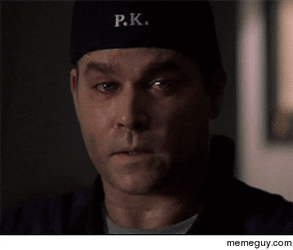Yeah, I know. I was thinking about that when the video of the kid with the bowls got posted a couple days ago in the LC thread. I’m guessing he didn’t have a lot of fun learning that trick.
Yeah, me too. I don’t really like to see kids doing incredible tricks. Gymnastics or Ice Skating in the US isn’t much better.
A friend of mine has a girl who is small and crazy athletic. They opted to stay out of gymnastics. She does soccer and some weird gymnastics like thing on ropes, but it doesn’t get all insanely competitive.
Gonna give risky some grief very shortly.
CATEGORY 2:
Most humbling scene for bad-ass tough guy or gal
Five entrants. I will retroactively place master’s/cassette’s entry for this category if they later submit it.
REVEALS AT 11
Lolwut
Coming in fifth for 1 point is DodgerIrish’s selection
I’m pleased to say Dodger’s other selections did not fall as flat with me. Now having said that, okay. This is a great scene. It’s a great movie. And it was shocking and satisfying to see Seagal bite it. But was this humbling? There is perhaps an argument to be made for Seagal being humbled enough to die in a movie, but at the time, he was at the top of his game. A bonafide action star who let himself die without costing himself anything.
The same thing could maybe be said about Tom Cruise in Tropic Thunder. I applaud the man for being willing to take a shot at himself, but I don’t see it as humbling for the character or the actor. I invite Dodger to defend their selection. I concede that I may be missing what makes this scene special.
This is a terrific movie, though. Roger Ebert said it best in his review for the film way back in 1996. “Any movie prepared to kill off Steven Seagal in the first 20 minutes is prepared for anything, and so I perked right up.”
Coming in fourth for 2 POINTS is King_of_NY.
This does not strike me as a humbling scene for Ray Liotta’s character. While he is slightly unnerved and perhaps worried Pesci will escalate to violence, he is emboldened, not humbled. What does this show him about violence? About intimidation? How does this contrast again his sense of self? Against anything he claimed earlier that he must now eat crow to swallow?
If you had picked, say, the scene where Ray is now in prison—that’s humbling. He earlier assured his wife that the only people who end up in prison are the men who are desperate to get away from their wives. That’ll never be him, baby. No no, that’ll never be him.
But now when she visits him behind bars, he has to convince her he’s not there for the only reason he said he would ever allow it to happen.
Coming in third for 3 POINTS is Johnny/Rex
This is a fantastic scene, and it is indeed humbling for everyone involved. I surprise myself putting it third. There was a time when I believed the Coens were gods among men, but it was only as time rolled on that I realized that was mostly due to the stunning synergy from their collaboration with Cormac McCarthy on No Country for Old Men.
But I cannot help but perceive some inescapable sarcasm inside everything else they’ve made, and it prevents me from giving this top honors.
Coming in second for FOUR POINTS is beetlejuice
!!!
I can’t add anything to what makes this scene so damn good that wasn’t already said by a couple of internet gents around six years ago.
it’s helpful to see The Conversation and its ending in terms of the limits of information. We have a character, Harry Caul, who seemingly has a god-like omniscience in terms of what he can hear - he has access to intimate, seemingly private conversations. He has access to all information, yet he misreads it. Though Caul’s omniscience is in terms of hearing, our metaphors tend towards sight, so I say that though Caul appears to be all seeing, there are extreme limits to that sight, which eventually destroy him.
Caul’s catholicism is treated very respectfully and it’s an essential part for him - when he destroys a ceramic religious figure in order to find the bug, it’s a self-destruction. He looks at the women in catholic terms, and this is a limit in his vision: there is the bad girl (Amy) who has sex in exchange for rent money; there is the good girl (Ann) who is in trouble and he must save. His vision, however, is entirely wrong - Amy truely cares for him, and Ann is using him as a patsy.
To focus on the bug at the end as something physical, as something concrete to be located, is a misunderstanding of the movie, I think. Caul is all-seeing, his expertise should allow him to locate any bug, yet he cannot. We have a last, metaphorical expression of someone all seeing, all hearing, who cannot locate the underlying thing of essential importance.
That means first place and FIVE POINTS and top honors for category 2 go to my boi smrk
Jesus this scene. It cannot be topped. The scene works on its own, but it is truly humbling in full context.
Remember that at the end of The Godfather I, Michael assured his wife Kay that he would make the business legitimate within five years. They have two children together. She believes he is a different man than the one he is replacing. The dons are dead. Long live Michael.
She needs to believe this so much that she takes his word when he denies that he ordered the assassination of two men.
But then the ending. The Corleone capos arrive, but there is no threat to Michael and Kay. They are here to honor Michael. They are here to serve the new Don Corleone.
From Michael’s point of view, he won. He has the wife and children he always wanted. Surely his wife sees through this charade now. Surely they can rule as they should on their terms, no one else’s. Which of course just means his terms.
Which sets up why this abortion scene in Godfather II is so humbling. After a series of events that threatened to ruin everything Michael achieved in the first film, he has won. He knows now that he was always going to win. God himself has stood in his way, and Michael has prevailed. He can return to his wife as a restored man capable of nurturing and loving her. She is the one person who has stood by him this entire way. The one person he can trust.
A miscarriage is awful, but it’s not her fault. Let him be her rock.
But it wasn’t a miscarriage. Everything he has worked so hard to achieve and preserve pushed her to kill his unborn child. For Michael, to rule as a Don is the greatest honor of his life. For Kay, it is her greatest horror.
The shock on his face is only eclipsed by his sudden violence. Is he humbled…or humiliated? What he feels is so extreme that there is no separating the two.
I never considered this thread might have some terrible spoilers. If I were judging this one I’d have to see the whole movie The Conversation - never seen it.
I see there’s a definite genre bias, and since life didn’t allow me time to submit, i’m gonna break the mold with what I would have submitted for this category. Second-hand embarrassment is my waterloo…it’s so hard for me to watch, so I give you this. (really, the entire first half of her law school time fits the bill, but that’s too long)
I choose…one of the best examples of a feminist movie of the 2000s (yeah, that’s right)
I’ve seen Legally Blonde more times than I can count. This is a great scene and would have been a great submission.
The movie is also unique for its approach to plot structure.
In traditional film plot structure, the plot forms a kind of W. That apex at the center of the W? That’s the center of the plot. Blake Snyder, author of SAVE THE CAT!, an excellent book on screenwriting, calls this the Midpoint False Victory. It is an emotional high, but it is a false high.
Now that false high descends into the end of Act II and the lowest point of the story: the Black Moment. Then you get the standard climax where the characters finally overcome their flaws and save the day. Easy and predictable, but satisfying.
Legally Blonde turns this structure on its head. Just four years later, the other still-popular feminist movie Mean Girls would use the same inverted plot.
Instead of a midpoint false victory, we get a midpoint false defeat. The character is humbled, but it is not a true loss. Instead, the Black Moment becomes a Bright Moment. The character gets what she always wanted–and it is worse than she imagined.
Now they must reckon not with fulfilling their destiny, but with its awful sacrifice.
It was like Scattergories, I’d thought of it for a different category but I didn’t really want to use it there. I was drawing a blank on this and had already devoted way too much brainspace.
And I really wanted to submit Steven Seagal dying.
Ray’s slightly unnerved
Thank you. I appreciate you clarifying.








